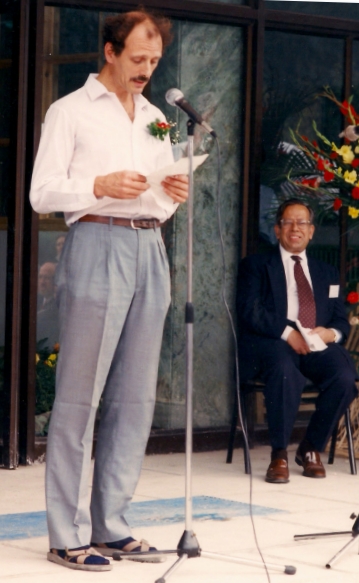Over the past few decades, China has witnessed a remarkable transformation in the field of international education. With globalization and an increasing appetite for a more globalized curriculum, international schools have become a significant part of the educational landscape. Expat educators have come from various countries and shared their knowledge with the kids in Beijing before moving on to the next destination.
But there’s a man who’s been here since the beginning. Michael Crook is one of the founders of Western Academy of Beijing (WAB) and he has been at the forefront of this evolution his whole life. Now in his 70s, the Brit, born and raised in Beijing, shares stories of his childhood in Haidian District in his fluent Beijing-accented Chinese. Now retired, he shares with jingkids in this exclusive interview his insights and experiences on how international education has changed, adapted, and thrived during his lifetime, shedding light on the journey that has shaped the educational opportunities of so many.
 When Western Academy of Beijing (WAB) was founded, what was the overall educational environment in Beijing like compared to now?
When Western Academy of Beijing (WAB) was founded, what was the overall educational environment in Beijing like compared to now?
When WAB was founded in the early 1990s, the educational environment for expatriate children in Beijing was quite limited. There were embassy schools primarily for diplomatic children, but they weren’t authorized to take non-diplomatic families. Some Chinese state schools made minimal accommodations for foreign students, like pull-out support programs, but these weren’t ideal solutions. The lack of appropriate schooling for expatriate children was becoming a serious problem for companies trying to bring staff to Beijing.
Compared to 30 years ago, there’s been a tremendous change that has been advantageous to the expat community. Now, there are many more schools for foreign nationals to choose from, including improved international sections in Chinese public schools and private schools offering various curricula (American, British, IB).
The expat population has actually dropped in the last decade, meaning more schools and fewer children, which translates to more choices for expat families. Overall, the situation is very welcoming for expats moving to Beijing due to the abundance of educational options.
 How have the cultural and social aspects of Beijing changed since the school first opened, and how have these changes impacted the international school community?
How have the cultural and social aspects of Beijing changed since the school first opened, and how have these changes impacted the international school community?
The growth of China’s economy has led to the emergence of a middle class that is more familiar with Western values and culture. Many of these people have studied and worked overseas and [are]often looking for more choices as well as alternatives to the highly competitive gaokao for their children’s education.
This cultural shift has significantly impacted the international school community. Many returning Chinese families now seek to enroll their children in international schools, and as a result, the student demographics in international schools have changed dramatically.
When WAB started in 1994, students were predominantly from North America and Europe, but now there’s a much larger proportion of students with Asian, particularly Chinese, roots.
This has brought both benefits, such as increased use of Chinese language among students and active parent involvement, and challenges in maintaining the school’s commitment to diversity.
 In your opinion, how have the economic and cultural developments in Beijing influenced the international education sector from the time you founded the school until today?
In your opinion, how have the economic and cultural developments in Beijing influenced the international education sector from the time you founded the school until today?
The economic and cultural developments in Beijing have significantly influenced the international education sector. The growth of the middle class has created a strong demand for international education and has influenced how schools like WAB approach diversity, moving beyond simple nationality metrics to consider factors like home language and other aspects of diversity.
There is also a complex dynamic at play, as families balance the desire for international education while also maintaining their children’s connection to Chinese culture and heritage. This has led to ongoing discussions about how to balance international perspectives with local cultural values in these schools.
 What were the core values and educational goals of WAB when it was founded, and how have they evolved over the years?
What were the core values and educational goals of WAB when it was founded, and how have they evolved over the years?
Well, at WAB, we’ve always believed in educating the whole child, partnering with parents, and championing our staff. These core values have remained constant since our founding.
Over the years, we’ve added to our mission, aiming to connect, inspire, challenge, and make a difference. These values and mission have really stood the test of time. They’re just as relevant today as they were when we started, and they continue to guide every decision we make as a school.
I think it’s important to note that while our core values haven’t changed, we’ve always been open to evolving our approach. For instance, we’ve embraced inquiry-based learning and student agency, which align well with our foundational philosophy. These concepts, which draw from educational theories like Montessori and John Dewey, have become integral to how we operate at WAB.
In terms of diversity, background, and their educational needs, how has the student body changed since the school’s inception?
When we first started, our student body was primarily from embassies and multinational companies in Beijing. We’ve always prided ourselves on the diversity of our community, and that’s something that has continued to this day. We welcome students from all around the globe, speaking a wide range of languages. We’ve always aimed to meet the needs of all learners, recognizing that everyone learns differently.
In recent years, there’s been a greater global focus on social-emotional learning and well-being. We’ve responded to this by initiating a school-wide mentoring program in 2019 and continually improving our integrated Social-Emotional Learning Curriculum from Early Years to Grade 12.
Has the quality of education changed from the early days of the school?
WAB has consistently maintained a high standard of education since we founded it in 1994. What’s changed is our understanding of what constitutes good learning.
We’ve always been at the forefront of educational innovation, guided by the latest educational and scientific research on how the brain works and learns. We’ve come to understand that great learning is long-term and goes beyond just acquiring knowledge. It’s also about gaining skills.
We know that students learn better when they feel safe and well, and when they feel ownership over their learning. This approach is quite different from traditional methods where students might memorize information just to pass a test and then forget it.
Our philosophy has always emphasized inquiry-based learning and student agency. We let our children ask questions and try to find solutions because they need to learn how to learn. This approach has been central to WAB from the beginning and continues to guide our educational practices today.  Over the years, what are the major shifts you’ve witnessed in international education in Beijing, and how has WAB adapted to them?
Over the years, what are the major shifts you’ve witnessed in international education in Beijing, and how has WAB adapted to them?
One of the big shifts we’ve witnessed is related to technology. When vast amounts of information is at your fingertips, it changes what you need to know.
Over time, the focus of learning has shifted from just acquiring knowledge to developing skills – interpersonal skills, collaboration skills, evaluation skills, and analytical skills. We’re now asking, how do you know what is true and what is not? Literacy has taken on a more critical aspect, especially with the advent of AI.
At WAB, we’ve been at the forefront of learning about and using new technologies, working with students on how to use them ethically and safely. We’ve also focused on ensuring our students are well-equipped with the skills and competencies to be successful in the future. We endeavor to stay up to date with the latest information from organizations like the OECD on what skills and attributes will be needed in the future, and we speak to business leaders about what they’re looking for in new employees.
Another significant shift is in how student learning is assessed. Assessment is no longer about ranking children, but rather about checking learning and identifying areas for growth. Even up to university entrance, there’s a strong movement towards a broader method to review student achievement and abilities. We’re moving away from defining students as a number and looking at how the breadth and depth of student achievement can be shared.
WAB is a member of the Mastery Transcript Consortium, working on a different way of sharing student successes. A mastery transcript is now accepted by close to 600 universities and colleges, including the Ivy League. This shows how we’re adapting to these changes in international education.
What is your learning philosophy and its connection to WAB?
My learning philosophy is deeply rooted in my family’s educational background. You see, education has been a part of my family for generations.
My great-grandmother taught French in Chengdu, and my grandmother started a Montessori school there in 1915, which was quite progressive for the time. I believe that learning is a natural process for children, and it doesn’t always require direct teaching.
The role of a teacher, in my view, should be that of a facilitator for learning. This aligns closely with the Montessori philosophy. I think it’s crucial to let children explore and learn through play, but with some supervision and guidance.
For instance, give children wooden blocks and let them discover concepts like balance, symmetry, and even basic physics on their own. This philosophy is deeply connected to WAB’s approach.
I also draw from John Dewey’s learning philosophy, where learning communities encompass all members of the community. This also ties in with my family, and my grandmother helped found, and served a principal of, the Chengdu Dewey School in the 1920s.
We emphasize inquiry-based learning and student agency. We encourage our students to ask questions and find solutions independently. It’s not just about absorbing information; it’s about learning how to learn.
At WAB, we’ve incorporated these ideas into our core values. We focus on educating the whole child, not just academically but also socially and emotionally. We believe in student participation in school management and even in conflict resolution.
For example, we train our fifth graders in mediation skills. So, you see, our learning philosophy at WAB is about creating active participants in the learning process, not just passive recipients of information. It’s about preparing our students for the real world by giving them the skills to think critically, solve problems, and work collaboratively. And I believe this approach is more relevant now than ever in our rapidly changing world.
Images: Western Academy of Beijing




